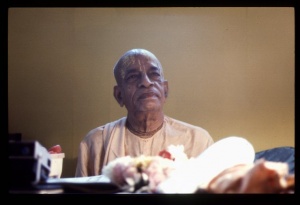SB 5.5.26

A.C. Bhaktivedanta Swami Prabhupada
TEXT 26
- sarvāṇi mad-dhiṣṇyatayā bhavadbhiś
- carāṇi bhūtāni sutā dhruvāṇi
- sambhāvitavyāni pade pade vo
- vivikta-dṛgbhis tad u hārhaṇaṁ me
SYNONYMS
sarvāṇi — all; mat-dhiṣṇyatayā — because of being My sitting place; bhavadbhiḥ — by you; carāṇi — that move; bhūtāni — living entities; sutāḥ — My dear sons; dhruvāṇi — that do not move; sambhāvitavyāni — to be respected; pade pade — at every moment; vaḥ — by you; vivikta-dṛgbhiḥ — possessing clear vision and understanding (that the Supreme Personality of Godhead in His Paramātmā feature is situated everywhere); tat u — that indirectly; ha — certainly; arhaṇam — offering respect; me — unto Me.
TRANSLATION
My dear sons, you should not envy any living entity—be he moving or nonmoving. Knowing that I am situated in them, you should offer respect to all of them at every moment. In this way, you offer respect to Me.
PURPORT
In this verse the word vivikta-dṛgbhiḥ, meaning without envy, is used. All living entities are the abode of the Supreme Personality of Godhead in His Paramātmā feature. As confirmed in Brahma-saṁhitā: aṇḍāntara-sthaṁ paramāṇu-cayāntara-stham. The Lord is situated in this universe as Garbhodakaśāyī Viṣṇu and Kṣīrodakaśāyī Viṣṇu. He is also situated within every atom. According to the Vedic statement: īśāvāsyam idaṁ sarvam (ISO 1). The Supreme Lord is situated everywhere, and wherever He is situated is His temple. We even offer respects to a temple from a distant place, and all living entities should similarly be offered respect. This is different from the theory of pantheism, which holds that everything is God. Everything has a relationship with God because God is situated everywhere. We should not make any particular distinction between the poor and the rich like the foolish worshipers of daridra-nārāyaṇa. Nārāyaṇa is present in the rich as well as the poor. One should not simply think Nārāyaṇa is situated among the poor. He is everywhere. An advanced devotee will offer respects to everyone—even to cats and dogs.
- vidyā-vinaya-sampanne
- brāhmaṇe gavi hastini
- śuni caiva śva-pāke ca
- paṇḍitāḥ sama-darśinaḥ
"The humble sage, by virtue of true knowledge, sees with equal vision a learned and gentle brāhmaṇa, a cow, an elephant, a dog and a dog-eater [outcaste]." (BG 5.18) This sama-darśinaḥ, equal vision, should not be mistaken to mean that the individual is the same as the Supreme Lord. They are always distinct. Every individual person is different from the Supreme Lord. It is a mistake to equate the individual living entity with the Supreme Lord on the plea of vivikta-dṛk, sama-dṛk. The Lord is always in an exalted position, even though He agrees to live everywhere. Śrīla Madhvācārya, quoting Padma Purāṇa, states: vivikta-dṛṣṭi jīvānāṁ dhiṣṇyatayā parameśvarasya bheda-dṛṣṭiḥ. "One who has clear vision and who is devoid of envy can see that the Supreme Lord is separate from all living entities, although He is situated in every living entity." Madhvācārya further quotes from Padma Purāṇa:
- upapādayet parātmānaṁ
- jīvebhyo yaḥ pade pade
- bhedenaiva na caitasmāt''
- priyo viṣṇos tu kaścana
"One who sees the living entity and the Supreme Lord as always distinct is very dear to the Lord." Padma Purāṇa also states, yo hareś caiva jīvānāṁ bheda-vaktā hareḥ priyaḥ: "One who preaches that the living entities are separate from the Supreme Lord is very dear to Lord Viṣṇu."